×
The Standard e-Paper
Home To Bold Columnists

National Assembly Finance Committee Chairman Joseph Limo(R) and Waihenya Ndirangu when they met National Treasury CS. Henry Rotich at Parliament on Wednesday 19/09/18 on taxation. [Boniface Okendo,Standard]
Members of Parliament have said they will shoot down new attempts by the National Treasury to remove caps on loan interest rates.